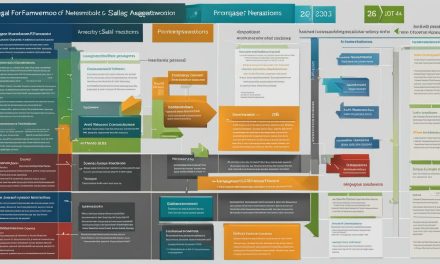Can independent professionals truly achieve stability and growth in their careers without the traditional security of a 9-to-5 job? As the freelance economy continues to evolve, this question becomes increasingly relevant for those navigating the world of independent work.
The shift towards freelancing is not just a trend; it’s a significant movement that’s reshaping the way we think about travail and entreprise. With the freelance market projected to grow, understanding how to build a sustainable activité that provides both financial security and professional fulfillment is crucial.
Whether you’re considering a career as a freelance professional or looking to strengthen your existing entreprise, navigating the challenges of independent work requires strategic planning and a clear understanding of your statut and how to manage your temps effectively.
Table of Contents
Key Takeaways
- Understand the current state and projected growth of the freelance economy.
- Discover strategies for establishing a sustainable freelance business.
- Learn how to overcome common challenges faced by freelancers.
- Gain insights into building a stable and growth-oriented freelance career.
- Explore the importance of managing your time effectively as a freelancer.
Understanding the Freelance Economy
As the world shifts towards more flexible work arrangements, understanding the freelance economy becomes increasingly important. The freelance market has experienced significant growth, with 1.2 million freelancers in France by 2020, representing a 110% increase over the past decade.
Defining Freelancing
Freelancing refers to the statut of working as an independent professional, choosing projects and clients rather than being permanently employed. In France, 90% of freelances declare having chosen this statut voluntarily, and 88% do not wish to return to full-time salaried work.
The Rise of Independent Work
The number of travailleur indépendant in France has seen a substantial increase, with the INSEE estimating 3.1 million independent workers in 2016, or 12% of the employed population. This shift towards independent work reflects a broader trend towards flexibility and autonomy in professional activité.
Freelancing in France vs. Global Trends
While global freelancing trends often focus on technology and creative sectors, France shows a strong presence of freelancers in consulting, engineering, and professional services. The French freelance ecosystem is characterized by specialized platforms, coworking spaces, and professional networks catering to independent professionals, supporting a diverse range of activité.
The distinct characteristics of the French freelance market, including its regulatory frameworks and social protections, set it apart from other European and global markets. Understanding these nuances is crucial for both local and international freelancers looking to navigate this growing economy.
Why Choose Freelancing as a Career Path
For those seeking autonomy and flexibility in their careers, freelancing presents a compelling alternative to traditional employment. As the freelance economy continues to grow, it’s essential to understand the benefits that make it an attractive career choice.
Freedom and Flexibility Benefits
Freelancing offers professionals the ability to integrate work commitments with personal priorities more seamlessly than traditional employment typically allows. The flexibility to design one’s schedule around peak productivity periods and energy levels can significantly enhance both work quality and personal wellbeing. According to survey respondents, both female and male freelancers value this flexibility, with women often citing scheduling freedom and men mentioning the ability to pursue personal passions.
Financial Potential and Control
Freelancing also provides the potential for higher financial rewards compared to traditional employment. By taking on multiple clients and projects, freelancers can increase their earning potential and diversify their income streams. This autonomy over their activité allows freelancers to manage their finances more effectively, making it possible to achieve a better work-life balance and plan for the future.
Work-Life Balance Opportunities
The elimination of commuting time and the ability to create a personalized schedule enable freelancers to achieve a better balance between their work and personal life. Freelancers can accommodate specific circumstances, such as managing childcare responsibilities or pursuing further education, making it an attractive option for those seeking more control over their temps and lifestyle. As a result, freelancing can lead to increased job satisfaction and overall wellbeing.
Most In-Demand Freelancing Fields

As the gig economy continues to grow, certain freelance fields are standing out for their high demand and pay. The freelance market is diverse, offering a range of opportunities for individuals with various skills. In this section, we will explore some of the most in-demand freelance fields.
Writing and Content Creation
Writing and content creation are highly sought-after freelance services. Businesses need high-quality content to engage their audiences, making skilled writers and content creators valuable assets. Whether it’s blog posts, articles, or website content, the demand for compelling writing is on the rise.
Design and Creative Services
Design and creative services are another area where freelancers can thrive. With the need for visually appealing content and branding, graphic designers, digital artists, and other creatives are in high demand. Their work helps businesses stand out in a crowded market.
Web Development and Programming
Web development and programming are critical areas for businesses looking to establish a strong online presence. Freelancers with expertise in coding, web design, and development are highly sought after. Their skills help businesses create functional, user-friendly websites and applications.
Marketing and Consulting
Marketing (4%) was listed as a primary skill by freelancers in the 2012 Freelance Industry Report. Strategic marketing consulting has emerged as a high-value freelance offering, with businesses seeking specialized expertise without committing to full-time hires. Key areas include:
- Digital marketing specializations in SEO, PPC advertising, social media strategy, and conversion optimization.
- Data analytics and performance marketing skills, which command premium rates due to the demand for measurable ROI.
- Marketing automation expertise, which has become highly marketable as organizations scale their efforts while maintaining personalization.
- Industry-specific marketing knowledge, creating opportunities for freelancers to position themselves as specialized consultants.
For more insights on lucrative freelance projects, visit our blog to explore further.
Getting Started in Freelancing

Embarking on a freelance career requires a strategic approach to establish a strong foundation. As you begin this journey, it’s crucial to focus on several key areas that will set you up for success.
Identifying Your Marketable Skills
The first step in becoming a successful freelance is to identify your marketable skills. This involves taking stock of your abilities, experience, and interests to determine what services you can offer to clients. Consider what you’re not only good at but also enjoy doing, as this will make your work more sustainable in the long term.
Setting Up Your Business Structure
In France, as a freelance professional, you’re required to register your business and issue invoices. You have the option to operate as either an individual enterprise or a company. The individual enterprise, particularly the micro-entrepreneur regime, is popular due to its simplicity. However, it’s essential to understand the implications of each structure on your personal liability and financial obligations. For more information on defining your pricing and identifying your targets, you can refer to resources like this guide.
Creating a Professional Online Presence
Establishing a professional online presence is vital for attracting clients and showcasing your portfolio. This includes creating a website that highlights your services, expertise, and past work. Additionally, maintaining professional social media profiles and engaging in content creation can help establish your authority in your field and improve your visibility in search engine results.
By focusing on these key areas, you can establish a solid foundation for your activité as a freelancer and set yourself up for long-term success.
Building a Stable Freelance Business
To achieve stability in freelancing, it’s crucial to develop a robust client acquisition strategy, create multiple revenue streams, and set sustainable rates that reflect the value you bring to clients. As a freelance professional, managing your business effectively is key to long-term success.
Developing a Consistent Client Acquisition Strategy
A consistent flow of clients is the backbone of any successful freelance business. This involves identifying your target market, building a strong professional network, and leveraging various marketing strategies to attract potential clients. By focusing on delivering high-quality work and fostering strong relationships, you can ensure a steady stream of repeat business and referrals.
- Identify your niche and understand the needs of your target clients.
- Develop a compelling portfolio that showcases your expertise.
- Utilize social media and professional networks to expand your reach.
Creating Multiple Revenue Streams
Diversifying your income sources can significantly enhance the stability of your freelance business. This can be achieved by offering a range of services, creating and selling digital products, or even developing passive income streams through investments or royalties. By not relying on a single client or service, you can mitigate financial risks and ensure a more consistent activité.
Setting Sustainable Rates
Determining the right taux for your services is critical to maintaining profitability. This involves conducting a comprehensive analysis of your frais, understanding the value you bring to clients, and researching the market to ensure your rates are competitive. Value-based pricing strategies can be particularly effective, as they focus on the outcomes and benefits delivered rather than just the time spent.
| Rate Structure | Description | Benefits |
|---|---|---|
| Hourly | Charging clients based on the time worked. | Simple to track, straightforward invoicing. |
| Project-Based | Quoting a fixed price for the entire project. | Encourages efficiency, clear expectations for clients. |
| Retainer | Clients pay a recurring fee for ongoing services. | Provides predictable income, fosters long-term client relationships. |
By implementing these strategies, freelance professionals can build a stable and thriving business that supports their long-term goals and financial security.
Financial Management for Freelancers
Effective financial management is the backbone of a successful freelancing career, enabling you to navigate the ups and downs of independent work. As a freelancer, you’re not just responsible for delivering high-quality services but also for managing the business side of your activity.

Budgeting with Irregular Income
Managing your finances with an irregular income requires discipline and planning. Freelancers must budget carefully to ensure they can cover essential expenses during lean periods. This involves tracking income and expenses closely and making adjustments as needed to maintain a stable financial situation.
Tax Planning and Obligations in France
As a freelancer in France, understanding your tax obligations is crucial. This includes registering for the appropriate tax regime and making timely payments. Freelancers must also consider their social security contributions (cotisations sociales) and how these impact their overall tax liability. The régime social des indépendants manages the mandatory social protection for freelancers, including retirement, health insurance, and other benefits.
Insurance and Retirement Planning
Freelancers must take proactive steps to manage their insurance and retirement needs. This includes considering professional liability insurance (responsabilité civile professionnelle) to protect against work-related claims. Health insurance is also vital, with many freelancers opting for complementary private insurance in addition to the national healthcare system. For retirement, freelancers should explore supplementary pension plans or investment strategies beyond the mandatory contributions to the French system.
- Professional liability insurance protects against claims related to your work.
- Health insurance considerations are crucial for freelancers in France.
- Retirement planning requires proactive management beyond mandatory contributions.
- Income protection insurance is important for freelancers without employer-provided sick leave.
- Asset protection strategies help safeguard personal wealth from business risks.
Legal Aspects of Freelancing

Navigating the legal landscape is crucial for freelancers in France to ensure compliance and stability. As a freelancer, understanding the legal framework that governs your work is essential for protecting your business and ensuring long-term success.
Understanding Contracts and Agreements
A well-structured contrat travail is vital for defining the terms of your engagement with clients. It’s essential to understand the elements that constitute a valid contract and how they impact your work. Freelancers should be aware of the potential risks and benefits associated with different contractual arrangements.
For instance, the distinction between a genuine independent contractor and a disguised employee (faux indépendants) is a significant legal concern in France. Authorities are increasingly scrutinizing working relationships to determine whether a freelancer is truly operating independently or is effectively controlled like an employee.
Intellectual Property Rights
Freelancers must also be aware of their rights regarding intellectual property. This includes understanding who retains ownership of the work produced and how to protect your creations. In France, certain professions have specific regulations regarding independent status, which can impact intellectual property rights.
For example, journalists are required to be classified as employees, regardless of their contractual arrangements, due to the loi Cressard. This highlights the importance of understanding the legal distinctions that apply to your specific profession.
French Legal Framework for Independent Workers
The French legal system provides various statuses for independent workers, including the auto-entrepreneur (micro-entrepreneur) status, which offers a simplified framework but comes with specific turnover limitations and operational constraints. Understanding the different legal structures available, such as entreprise individuelle, EIRL, and SASU, is crucial for making informed decisions about your freelance operation’s legal foundation.
Moreover, the concept of lien subordination plays a critical role in determining whether a freelancer is considered an employee or an independent worker. This distinction has significant implications for your statut and rights as a travailleur indépendant or salarié.
Overcoming Common Freelancing Challenges
The freelance journey is not without its obstacles, but understanding these challenges can help mitigate them. Freelancing offers numerous benefits, but it also presents unique challenges that can impact a freelancer’s stability and growth. Understanding these challenges is crucial for developing effective strategies to overcome them.
Dealing with Isolation and Remote Work
One of the significant challenges freelancers face is isolation and the lack of social interaction that comes with remote work. To combat this, freelancers can join online communities, attend networking events, or work from co-working spaces. These strategies can help maintain a sense of connection and community.
Managing Client Expectations
Managing clients’ expectations is vital for successful freelance projects. This involves clear communication about project scope, timelines, and deliverables. Establishing a comprehensive contrat that outlines these details can help prevent misunderstandings and ensure both parties are aligned.
Handling Payment Issues
Payment issues are a common challenge for freelance workers, with factors such as industry, skills, experience, and location influencing paiement rates. To mitigate payment problems, freelancers can implement preventative measures like deposit requirements and milestone payments. Utilizing online payment platforms that offer protection and dispute resolution services can also help secure payments from clients, reducing the risk of problematic cas.
Scaling Your Freelance Business for Growth

The journey from a solo freelancer to a thriving business owner involves several key steps and strategic decisions. As you scale, you’ll need to adapt your business model to accommodate growth while maintaining the quality of your services.
From Freelancer to Agency Owner
Transitioning from a solo freelancer to an agency owner involves building a team that can deliver high-quality work. This strategic expansion allows you to take on larger projects and attract bigger clients.
Productizing Your Services
Productizing your services involves creating standardized offerings that can be sold and delivered efficiently. This approach enables you to scale your business without being directly involved in every project.
Strategic Partnerships and Collaborations
Forming strategic partnerships can significantly enhance your business’s growth potential. Key strategies include:
- Complementary service provider partnerships create referral networks and comprehensive client solutions.
- White-label arrangements allow you to offer expanded services through trusted partners.
- Agency relationships can provide a consistent project flow.
- Collaborative project approaches enable you to take on larger, more complex work.
- Strategic alliances with technology platforms can create preferential positioning and client acquisition opportunities.
By implementing these strategies, you can effectively scale your freelance business and achieve sustainable growth.
Leveraging Technology and Tools
By embracing the right technology and tools, freelancers can achieve greater stability and growth in their careers. Effective utilization of these resources enables freelance professionals to streamline their workflow, enhance productivity, and better serve their clients.
Project Management Solutions
Freelancers can benefit from project management tools that help organize tasks, track progress, and collaborate with clients. These solutions improve the overall fonctionality of freelance work.
Accounting and Invoicing Software
Reliable accounting and invoicing software is essential for managing the financial aspect of freelance work. It simplifies tasks such as billing clients and tracking expenses related to their web activity or business activité.
Communication and Collaboration Platforms
Effective communication is key to successful freelance projects. Utilizing collaboration platforms enhances the ability to work with clients and team members efficiently.
Marketing and Client Acquisition Tools
To attract new clients and grow their business, freelancers can leverage various marketing tools. These include customer relationship management (CRM) systems, email marketing platforms, social media management tools, portfolio presentation tools, and proposal automation systems.
- Customer relationship management (CRM) systems organize prospect and client information while tracking interactions and opportunities.
- Email marketing platforms enable nurture campaigns, portfolio showcases, and regular communication with your network.
- Social media management tools streamline content publishing and engagement across multiple platforms.
- Portfolio and case study presentation tools showcase your work effectively to potential clients.
- Proposal and contract automation systems accelerate the client acquisition process with professional documentation.
Future-Proofing Your Freelance Career
In the ever-changing freelance market, future-proofing your career is paramount. As a freelancer, staying ahead of the curve means being proactive about your professional development and adapting to shifts in the market.
Continuous Skill Development
To remain competitive, it’s essential to continuously update your skills. This involves staying abreast of the latest trends and technologies in your field. By doing so, you not only enhance your professionnel capabilities but also increase your value to potential clients. Engage in online courses, attend workshops, and participate in webinars to expand your skill set.
Adapting to Market Changes
The freelance activité is heavily influenced by market demands. Being flexible and able to pivot your services in response to these changes is crucial. This might involve diversifying your services or exploring new markets. For instance, if you’re a writer, you might consider expanding into content creation for new media platforms.
Building a Personal Brand
Establishing a strong marque or personal brand is vital for long-term success. This involves creating a consistent identity across all your professional touchpoints, from your website to your social media profiles. A well-crafted personal brand helps you stand out in a crowded marketplace and attracts ideal clients. For more insights on building a successful freelance career, you can read our related article on freelance work and career success.
| Strategy | Description | Benefit |
|---|---|---|
| Continuous Learning | Engage in ongoing education and training | Enhanced professional capabilities |
| Market Adaptation | Diversify services and explore new markets | Increased resilience to market fluctuations |
| Personal Branding | Develop a consistent professional identity | Improved visibility and client attraction |
Conclusion
With strategic planning and continuous adaptation, freelancing can be a sustainable and rewarding career choice. To achieve long-term success, it’s essential to combine business acumen with specialized expertise. Financial stability comes through diversified income streams and sound financial management practices. For instance, understanding the differences between various work statuses, such as freelance and employee work, can significantly impact your activité and travail conditions. By focusing on professional growth and adapting to market changes, freelancers can secure a stable statut in the ever-evolving professional landscape.
FAQ
What are the key benefits of choosing a freelance career path?
Freelancing offers numerous benefits, including freedom and flexibility, allowing professionals to choose their projects, set their schedules, and work from anywhere. It also provides financial potential and control over earnings, as well as opportunities for a better work-life balance.
How do I identify my marketable skills as a freelancer?
To identify your marketable skills, consider your professional experience, education, and personal strengths. You can also take online assessments or consult with career coaches to help you discover your strengths and align them with in-demand services in the freelance market, such as writing and content creation, design and creative services, or web development and programming.
What are the most in-demand freelancing fields?
The most in-demand freelancing fields include writing and content creation, design and creative services, web development and programming, and marketing and consulting. These fields are constantly evolving, and having expertise in one or more of these areas can provide a stable foundation for a freelance career.
How do I manage irregular income as a freelancer?
To manage irregular income, it’s essential to create a budget that accounts for fluctuations in earnings. You can also consider diversifying your revenue streams by offering multiple services or working with various clients. Additionally, setting aside funds for taxes and emergencies can help you navigate financial uncertainty.
What are the tax obligations for freelancers in France?
As a freelancer in France, you’re required to pay income tax on your earnings. You may also need to pay social security contributions, depending on your status as a micro-entrepreneur or independent worker. It’s recommended that you consult with a tax professional to ensure you’re meeting your tax obligations and taking advantage of available deductions.
How can I protect my intellectual property rights as a freelancer?
To protect your intellectual property rights, it’s crucial to understand your contracts and agreements before signing them. You should also consider registering your work with the relevant authorities, such as the French National Intellectual Property Office (INPI). Additionally, including clear terms and conditions in your contracts can help safeguard your rights.
What are the benefits of continuous skill development for freelancers?
Continuous skill development is essential for freelancers to stay competitive in the market, adapt to changes in their industry, and expand their service offerings. By investing in ongoing education and training, freelancers can enhance their expertise, increase their earning potential, and build a strong personal brand.





